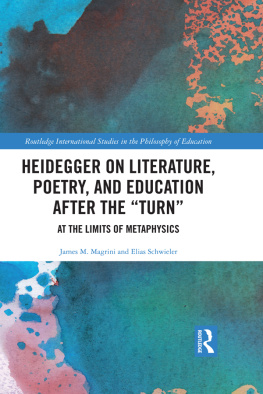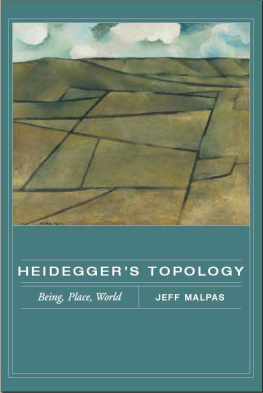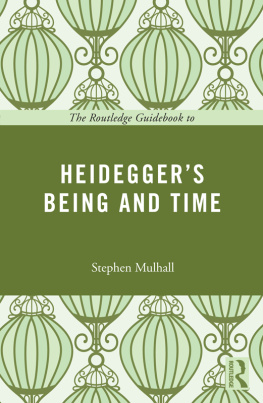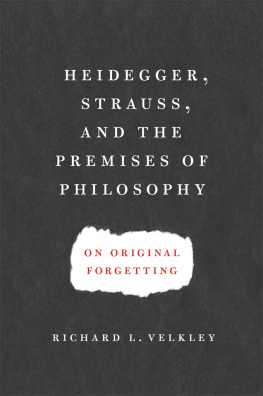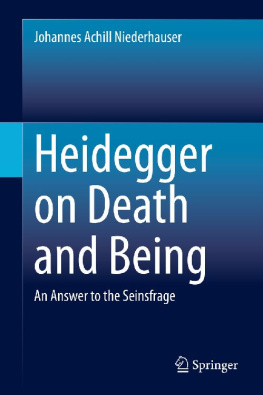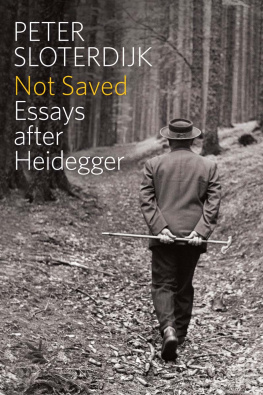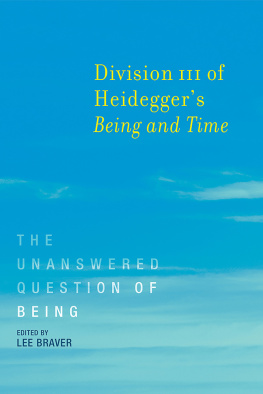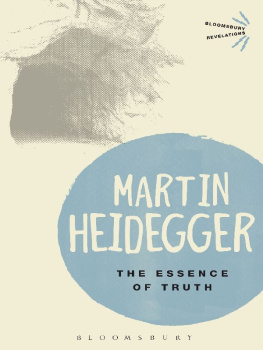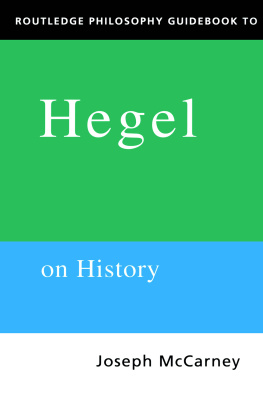
This is a book of many virtues. It undertakes the conversation that the later Heidegger was too haughty and the mature Marcuse too disappointed to initiate. In light of this conversation, both Heidegger and Marcuse scholars will be provoked to take a deeper and more fruitful approach to these two giants of twentieth century philosophy. More important still, the books brilliant readings of Plato, Aristotle, Heidegger, and Marcuse give new resonance to Feenbergs own work and open up new avenues for his extraordinarily circumspect and incisive social philosophy.
Albert Borgmann, University of Montana
The Heidegger and Marcuse controversy over technology is an exciting story, not yet told, and Feenberg is clearly the one to do it.
Douglas Kellner, University of California at Los Angeles
It is well known that Marcuse was a student of Heidegger, and it is clear that the theme of technologys deep transformation of our experience is quite prominent in both. But there has been little serious, detailed, philosophically informed treatment of this common issue in both thinkers.
Feenbergs book admirably fills that gap and more, illuminating each philosopher by comparison and contrast with the other, and finally offering an extremely well-informed and original perspective on the issue. (Modern technological pessimism rarely admits the possibility of the redemption announced in the subtitle.) This is certainly the most philosophically ambitious and thoughtful treatment of Marcuse yet published, and is in its own right a sophisticated, compelling meditation on critical theory and our technological fate.
Robert Pippin, University of Chicago
Heidegger
and Marcuse
The Catastrophe and
Redemption of History
Andrew Feenberg

Published in 2005 by
Routledge
270 Madison Avenue
New York, NY 10016
www.routledge-ny.com
Published in Great Britain by
Routledge
2 Park Square
Milton Park, Abingdon
Oxon OX14 4RN U.K.
www.routledge.co.uk
Routledge is an imprint of the Taylor & Francis Group.
This edition published in the Taylor & Francis e-Library, 2005.
To purchase your own copy of this or any of Taylor & Francis or Routledges collection of thousands of eBooks please go to www.eBookstore.tandf.co.uk.
2005 by Taylor & Francis Books, Inc.
All rights reserved. No part of this book may be reprinted or reproduced or utilized in any form or by any electronic, mechanical or other means, now known or hereafter invented, including photocopying and recording or in any information storage or retrieval system, without permission in writing from the publishers.
Library of Congress Cataloging-in-Publication Data
Feenberg, Andrew.
Heidegger and Marcuse : the catastrophe and redemption of history / Andrew Feenberg.
p. cm.
Includes bibliographical references.
ISBN 0-415-94177-6 (hardcover : alk. paper) - ISBN 0-415-94178-4 (pbk. : alk. paper)
1. Heidegger, Martin, 1889-1976. 2. Marcuse, Herbert, 1898 3. Technology-Philosophy-History-20th century. I. Title.
B3279.H49F387 2004
193dc22
2004019355
ISBN 0-203-48900-4 Master e-book ISBN
ISBN 0-203-57610-1 (Adobe eReader Format)
Contents
Acknowledgments
Like most authors, I owe thanks to many people, most especially Junichi Murata, Shunsuke Kadowaki, and Yasuo Kobayashi for inviting me to the University of Tokyo Center for Philosophy to lecture on the themes in this book. Gernot Bhme also generously included me in his conference on Critical Theory of Nature where I presented an early version of my argument. Richard Polt and Albert Borgmann encouraged me at an early stage. Robert Pippin was an insightful interlocutor. Debates with Iain Thomson and Jerry Doppelt have enabled me to sharpen many of my ideas. Jeffrey Kochan, Dana Belu, Jessica Thompson, and John Abromeit sent me useful comments. Anne-Marie Feenberg has once again been the faithful reader of too many drafts to count.
Preface
I arrived in La Jolla, California in the fall of 1965 as a graduate student in philosophy. One of my reasons for coming was what I had heard of Herbert Marcuse. He was not yet famous but he was well known and what was known about him intrigued me. I was interested in phenomenology, but a philosopher wild enough to synthesize Marx and Freud was wild enough for a young graduate student looking for an alternative to the dry as dust positivism then dominating American philosophy.
At the first opportunity I asked Professor Marcuse to help me study Martin Heideggers Being and Time. He accepted my proposal and we spent many Tuesday afternoons debating the meaning of obscure passages in this book which, unbeknownst to me, had inspired Marcuse to leave Berlin for Freiburg 38 years before.
One afternoon as we left Marcuses office a magnificent sunset appeared before us. Standing on the balcony of the Humanities Building dazzled by the spectacle of nature, Marcuse turned to me and said, in his deep, heavily accented voice, Make me a phenomenological reduction of this! I was unable to reply. I remember feeling the demand to be unfair, sarcastic.
Zen Buddhists are supposed to achieve sudden enlightenment meditating on an unsolvable problem called a koan. Phenomenology seemed to collapse in the face of Marcuses stunning koan, but sudden enlightenment did not follow. It could not possibly have occurred to me then that the rejection of a phenomenological reduction that late afternoon confirmed yet again Marcuses decision to abandon Heideggers mentorship in 1933. He had found another way to understand beauty and its promise of happiness.
A few months later, my fellow graduate students and I created a magazine to publicize our anti-war views. Recall that this was early on in the Vietnam War and the American public was still supportive. Dissent was the act of a small minority to which we belonged. We asked Marcuse for an article to start us off. He contributed The Individual in the Great Society (Marcuse 1966a). This article described the suppression of individuality under the impact of technological advance. It ends with a convoluted passage I want to quote here as it offers a clue to my koan and the agenda of Marcuses later work which I try to understand in this book.
Under both aspects, the traditional concept of the individual, in its classic-liberal as well as Marxist form seems to be untenablecanceled (aufgehoben) by the historical development of productivity. Authentic individuality would remain the distinction of the creative artist, writer, or musician. The idea of making this creative potential general among the population at large militates against the very function and truth of the artistic creation as a form of expression because it [art] implies dissociation from, and negation of, common sense and common values: ingression of a qualitatively different reality in the established one. In the case of the second alternative (fundamental transformation of the society), individuality would refer to an entirely new existential dimension: to a domain of play, experiment, and imagination which is outside the reaches of any policy and program today. (Marcuse 2001, 80)
This article was composed in 1965. It accurately foresaw the shipwreck of Lyndon Johnsons Great Society on the rock of Vietnam. What it did not, could not foresee was the rise of the New Left and the counter-culture. At that time demonstrations against the war in Vietnam on most campuses, including ours, attracted students by the dozens, not the thousands, who would soon be mobilized by the anti-war movement.
Next page


